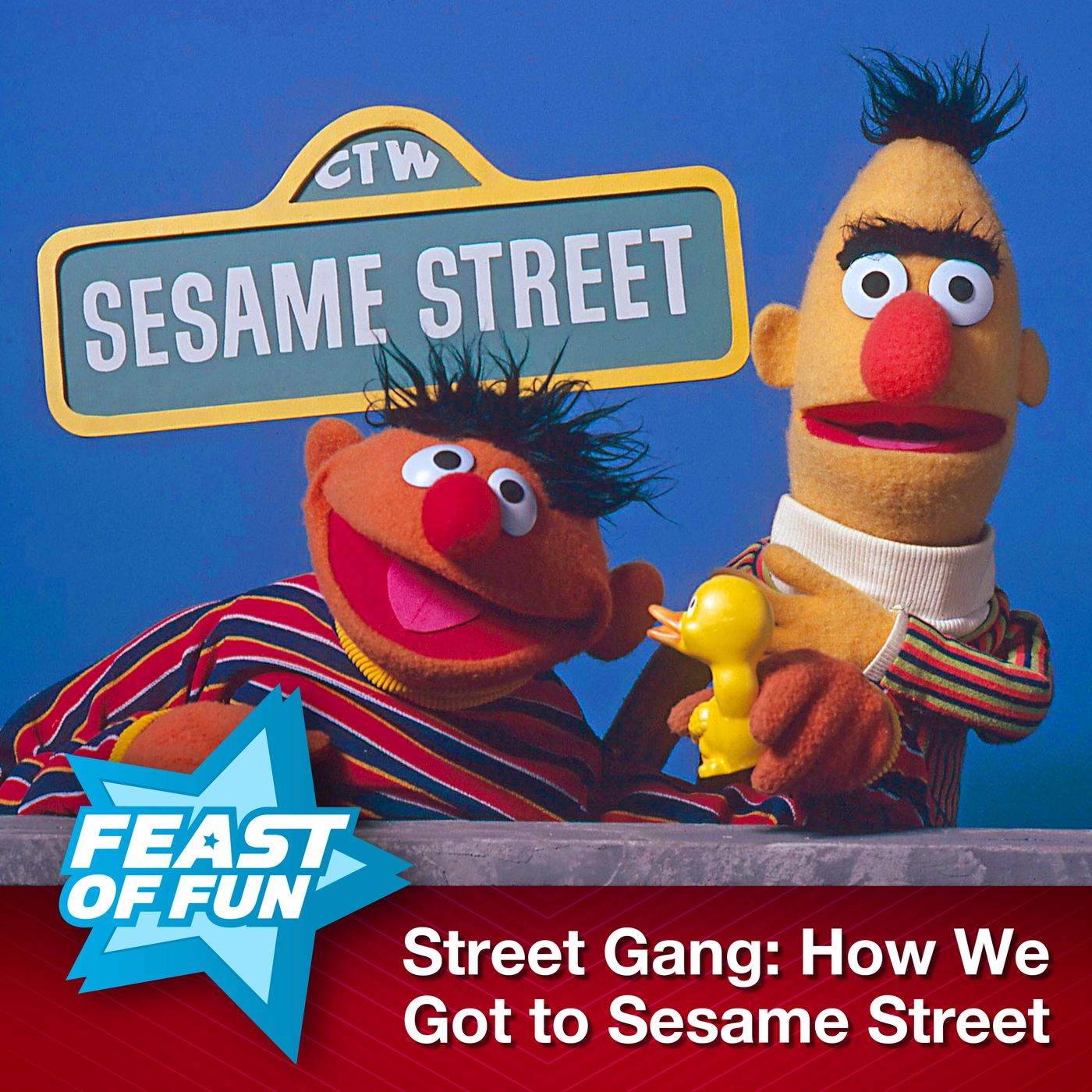
Sesame Street is one of the most influential television programs of all time. Premiering in 1969, its profound legacy impacted generations. Millions of children and adults were both educated and entertained as they watched a world that embraced diversity and inclusiveness.
And lovable grouches who live in garbage cans.
In 2009 we had the pleasure of interviewing biographer Michael Davis, author of the amazing book Street Gang: The Complete History of Sesame Street. This year Michael Davis’ book is the source material for a feature documentary film, STREET GANG: HOW WE GOT TO SESAME STREET.
The documentary, directed by Marilyn Agrelo is now out in theaters and is receiving great reviews. Ben Kenigsberg of the New York Times says “even nostalgia-resistant viewers can learn something from this documentary version of a book on the making of the show.”
Please enjoy this encore presentation.
-----------------------
{Best of Feast of Fun, FOF #926 - Sesame Street Cred - 02.06.09}
Sesame Street began in 1969 as a result of a question posed at a dinner party: “Could television be used to teach children, could learning be a form of entertainment?”
After forty years, the award winning program not only taught oodles of children how to count and recite the alphabet, but also taught them to embrace diversity and inclusiveness.
Whether black or white, tall and yellow or small and green, everyone had a home on Sesame Street.
We love the muppets because, much like ourselves, they aren’t perfect creatures. We see our own humanity in those furry faces with beady eyes as they deal with problems of everyday life.
Sesame Street showed animals, monsters and people living together and working through their differences, which influenced a huge population of children that eventually grew up to enthusiastically support diversity, technicolor hair and our nation’s first black president.
Street GangOn today’s show we’re talking to author Michael Davis about his book Street Gang: The Complete History of Sesame Street. In his book Michael takes an in-depth look at the groundbreaking program from it’s inception to the present day, covering some interesting behind-the-scenes conflicts which were a part of the creative energy of the show.
Listen as we talk with Michael about hipsters and squares and the program’s counter cultural influence, KAMI, the HIV Positive Monster from South Africa and Bert & Ernie as Gay Icons
Find out how Sesame Street coped with the painful death of Actor Will Lee, who portrayed Mr. Hooper on the show, and the deaths of the behind the scenes masters: puppeteer Richard Hunt from AIDS, musician Joe Raposo from cancer and Muppet founder Jim Henson from toxic shock syndrome.
Plus questions from you, the listeners.
[Originally posted on February 6, 2009.]
view more
And lovable grouches who live in garbage cans.
In 2009 we had the pleasure of interviewing biographer Michael Davis, author of the amazing book Street Gang: The Complete History of Sesame Street. This year Michael Davis’ book is the source material for a feature documentary film, STREET GANG: HOW WE GOT TO SESAME STREET.
The documentary, directed by Marilyn Agrelo is now out in theaters and is receiving great reviews. Ben Kenigsberg of the New York Times says “even nostalgia-resistant viewers can learn something from this documentary version of a book on the making of the show.”
Please enjoy this encore presentation.
-----------------------
{Best of Feast of Fun, FOF #926 - Sesame Street Cred - 02.06.09}
Sesame Street began in 1969 as a result of a question posed at a dinner party: “Could television be used to teach children, could learning be a form of entertainment?”
After forty years, the award winning program not only taught oodles of children how to count and recite the alphabet, but also taught them to embrace diversity and inclusiveness.
Whether black or white, tall and yellow or small and green, everyone had a home on Sesame Street.
We love the muppets because, much like ourselves, they aren’t perfect creatures. We see our own humanity in those furry faces with beady eyes as they deal with problems of everyday life.
Sesame Street showed animals, monsters and people living together and working through their differences, which influenced a huge population of children that eventually grew up to enthusiastically support diversity, technicolor hair and our nation’s first black president.
Street GangOn today’s show we’re talking to author Michael Davis about his book Street Gang: The Complete History of Sesame Street. In his book Michael takes an in-depth look at the groundbreaking program from it’s inception to the present day, covering some interesting behind-the-scenes conflicts which were a part of the creative energy of the show.
Listen as we talk with Michael about hipsters and squares and the program’s counter cultural influence, KAMI, the HIV Positive Monster from South Africa and Bert & Ernie as Gay Icons
Find out how Sesame Street coped with the painful death of Actor Will Lee, who portrayed Mr. Hooper on the show, and the deaths of the behind the scenes masters: puppeteer Richard Hunt from AIDS, musician Joe Raposo from cancer and Muppet founder Jim Henson from toxic shock syndrome.
Plus questions from you, the listeners.
[Originally posted on February 6, 2009.]
More Episodes
My First Bodybuilding Competition
 2023-12-06
2023-12-06
 2023-12-06
2023-12-06
Meet My Coach: Matt Claussen
 2023-11-13
2023-11-13
 2023-11-13
2023-11-13
John Michael's Spank Bank Time Machine
 2023-11-07
2023-11-07
 2023-11-07
2023-11-07
Celebrating Queer Horror Icon Vincent Price
 2023-11-01
2023-11-01
 2023-11-01
2023-11-01
Tyler Fluitt: Harm Reduction for Steroids
 2023-10-23
2023-10-23
 2023-10-23
2023-10-23
Holly Hughes Takes a Trip to Barbieland
 2023-08-29
2023-08-29
 2023-08-29
2023-08-29
Barbie and the Hollywood AI Apocalypse
 2023-07-21
2023-07-21
 2023-07-21
2023-07-21
A Thousand Barbie Dolls
 2023-07-18
2023-07-18
 2023-07-18
2023-07-18
George Ward Builds Impossible Muscle
 2023-06-06
2023-06-06
 2023-06-06
2023-06-06
Dan Cass Gets Untucked
 2023-05-15
2023-05-15
 2023-05-15
2023-05-15
I Have Cancer, Again
 2023-05-09
2023-05-09
 2023-05-09
2023-05-09
Dr. Steven Thrasher on the Viral Underclass
 2023-04-18
2023-04-18
 2023-04-18
2023-04-18
012345678910111213141516171819
Create your
podcast in
minutes
- Full-featured podcast site
- Unlimited storage and bandwidth
- Comprehensive podcast stats
- Distribute to Apple Podcasts, Spotify, and more
- Make money with your podcast
It is Free
- Privacy Policy
- Cookie Policy
- Terms of Use
- Consent Preferences
- Copyright © 2015-2024 Podbean.com






